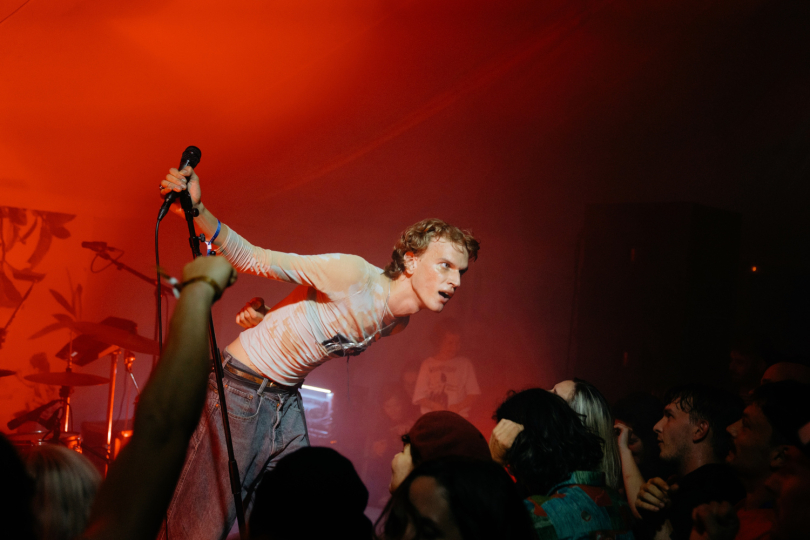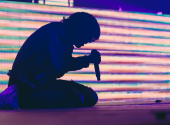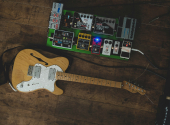
TOP 5 Tips for Better Communication with the Audience
"I want to see your hands! How are you? Cheers! Don't worry, we won't bite you, come closer to the stage. And now everyone! But this is really going to be the last one. We love you! Thank you, and the next song is..." You must have heard these and other similar phrases more than once at a concert of your favourite artist or band. Communicating with the audience is a big challenge for many musicians – we'd rather just play, but we have to say something into the microphone, don't we? After all, speaking on stage between songs and keeping the evening flowing smoothly is as important a skill as mastering an instrument or one's vocal cords. Let's take a look at the TOP 5 tips for better communication with your audience.
1. Take inspiration from the best
This might be the first thing that pops into your head. Just look at concerts by Bruce Springsteen, Prince, The Rolling Stones or Arcade Fire and you'll know right away how to do it. I wish it worked like that. Legends and musical icons have a tremendous amount of experience and years of practice on the biggest stages in the world, so if you try to bring Bono's lines to the stage of your local cultural venue or get the crowd to sing along in a Freddie Mercury style, you're probably not going to succeed. You may even be seen as an arrogant pseudo-star, and the evening will be seriously disrupted.
Try to get inspired by the communication practices of the biggest stars and apply them to your current situation. If you are standing in front of a festival crowd and you feel they're enjoying the chorus of the song you're playing, feel free to make them sing along or encourage spontaneous action. But don't do it in a small club with thirty bored faces staring at you, arms crossed, and a "Show us what you got, dude!" expression.
You can even intentionally work with silence. Do you know that feeling when five seconds of silence after a song seems like an eternity? If you have the courage, enjoy the silence and let the audience know it's intentional. You can stare at them intently and see what happens. In my experience, something definitely will happen that you didn't expect. It can turn into a magical moment that adds energy and a sense of release to the performance.
Pay attention to details, body language and, above all, the context of your situation. If you are fully present and tuned into the atmosphere of the evening, your remarks will not come out empty. You'll be able to react to surprising twists, technical problems or other pitfalls spontaneously, authentically and with ease.
2. Alter ego
How is it possible that many of the world's rockstars are solitary weirdos in their private lives, quiet people or lovers of quiet evenings with a book? Artists are sensitive souls. They overreact to the sometimes harsh realities of everyday life. Their childhoods are often marked by the trauma of being a bit special, as they didn't know how to fit in and it took them a while to understand why they were so different. Music is their home, a safe haven, an oasis with lush mango trees, a place where they can be themselves. And if fame "happens" to them, they are suddenly under the pressure of their fans' expectations.
To manage this entrance into the spotlight and not go crazy, they created an alter ego, a parallel second personality that rules the stage and the public space. In private, they can return to their true essence. This schizophrenia is a necessity, because while the audience appreciates an intimate moment and an authentic glimpse inside the artist, they still mainly want to be entertained, to forget about the boring reality of everyday life and be seated on a spaceship that will launch them to a distant musical planet.
There has been a lot of talk lately about authenticity, which keeps coming up on all social media. Yes, you can be authentic and ditch the alter ego or some dramatic stunts, but only if your real personality is interesting and charismatic enough to engage your audience. Otherwise, I recommend you find your strongest position that you feel comfortable in on stage and that will give you the confidence and inspiration you need for a concert show.
3. Minimize clichés
As I mentioned in the introduction, some phrases are probably immortal and the call "I want to see your haaands!" voiced at the right moment will work. There is no need to be original at all costs, but try to keep clichéd phrases within reason and use them in the right places.
It's not a bad idea to have a dress rehearsal with spoken word as part of your band practice. Do you know when you're going to introduce the band? Will you start talking after the first, second or third song? What are you going to say? If you leave everything to chance and hope the muse will kiss you, that's not a good strategy, especially if you're just starting out. It's easy to stutter, repeat the same thing over and over again or simply lose the thread and with it the rest of your confidence.
Prepare a few sentences about your songs, a welcome speech (as brief as possible), thank the organizers of the evening, the sound engineers, the crew, introduce the band and don't forget to mention your merch stand. Have a structure of the evening in mind, just like the presenters on TV, and a few pre-prepared topics you can talk about coherently and clearly.
But at the same time, be careful not to be too rigid. If you say the same lines at the same moments during every concert, you will lose spontaneity and the fans who come to see you regularly will get bored.
4. Keep the flow
Talking too much is as bad a strategy as not talking at all on stage. You might overdo it with the pre-concert doping and suddenly launch into a rant about politics, the music business or human nature, share a trivial, long-winded story with no punchline, or attack the audience who are too passive for your taste.
You don't even have to turn the concert into a cabaret and throw around jokes like Jerry Seinfeld. You're not an entertainer or a comedian, the audience wants to hear you play. But they also want to hear a few short stories that give them a glimpse into your kitchen, or soul.
The "flow" is an essential attribute of a concert that your audience will never forget. Your music, words and stage show form an energy field that electrifies the entire room, the audience is connected to you and everything flows naturally in a magical world that mysteriously emerges in the moment.
5. Try new ways
Don't be afraid to try different ways of communicating (especially if you are starting out). Your music and the way you communicate it should fit together. The frontman or frontwoman of a metal band will use a different vocabulary than the frontman or frontwoman of a big band. That's probably obvious. However, you don't have to follow all the unwritten rules of the genre. You can be a metal gentleman with a sophisticated delivery or, conversely, a slightly punk saxophonist in a jazz trio.
It is important to feel the mood of the audience. Do they like me in this role? Do they enjoy it? And more importantly, do I enjoy it? You can't go too far and take on roles that you find repulsive just because people enjoy it. That will eventually destroy your soul. You can only play with alter egos to the point where it's fun for you and you enjoy the role you're playing on stage.
But as they say, be careful what you wish for. You may unwittingly set up a golden cage that your own audience will lock you in. If you find that a certain way of communicating works, you and the audience enjoy it, then keep it up, but don't forget to add elements of surprise to keep your fans in suspense and awe.
If you have found an error or typo in the article, please let us know by e-mail info@insounder.org.





